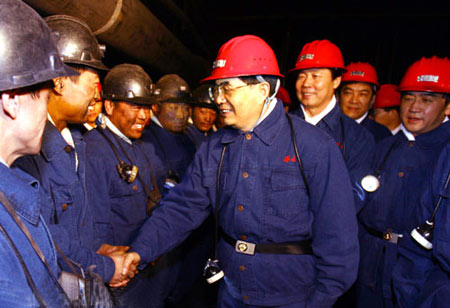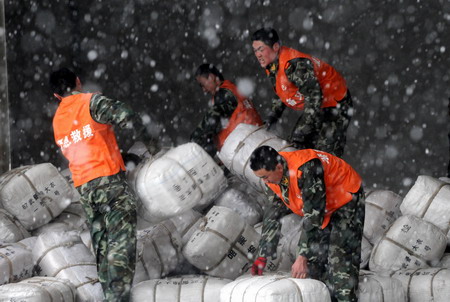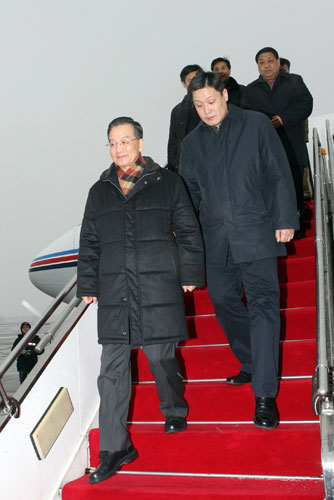President Hu Jintao has ordered the military to spare no effort in disaster relief, as severe weather conditions have been forecast to continue nationwide.

President Hu Jintao on January 31, 2008, asks the miners to produce as much coal as they could safely to provide more fuel for generating electricity amid a nation-wide shortage.
Since Hu's call on Wednesday, five large military transport airplanes have been deployed to Guizhou province and the Guangxi Zhuang autonomous region, and more than 100 other planes and helicopters are standing by.
Across the country, 250,000 army troops and the Chinese People's Armed Police, and 770,000 paramilitaries have been dispatched to help in regions most affected by the disaster.
Meanwhile, Premier Wen Jiabao returned to Hunan province, the hardest-hit area, on Friday afternoon, just three days after making a surprise visit to sites where tens of thousands of people were stranded at railway stations, expressways and airports.
The top priorities at present are to "repair the transport facilities to ensure smooth road and rail traffic, guarantee electricity by restoring power grids as soon as possible, and ease the public - in other words, settle people's issues, particularly the food, heating and health concerns of the stranded passengers," Wen told local authorities.
On Friday morning, just before he left for Hunan, the premier chaired an urgent executive meeting of the State Council to discuss the national situation of relief work.
"The most difficult time has not passed," he said.
But a senior official in Beijing assured the public on Friday that the serious losses the disaster had caused the economy would be temporary.
Zhu Hongren, deputy department director in charge of economic operation under the National Development and Reform Commission (NDRC), told a press conference the economy will remain stable in the long run.
"The government will do what it can to send all people stuck in trains, on expressways and at railway stations back home.
"Local governments will also ensure that those who choose to stay where they work for the Spring Festival enjoy a happy holiday season," he said.

Soldiers load quilts and winter clothes onto trucks in snow in Wuhan, central China's Hubei Province to transport the materials to blizzard-hit provinces. More bad weather was forecast for China's central, southern and eastern regions which were already paralyzed by record-breaking cold and snow.
Responding to rising concerns of possible price hikes in the coming weeks, Zhu said the government will strengthen the monitoring of prices and organize the transportation of products accordingly.
The icy rain and snowstorms since Jan 10 - China's worst in decades - have caught the nation by surprise.
As of Thursday, the harsh weather had caused direct economic losses of 53.8 billion yuan ($7.5 billion), and affected 19 provinces, regions and municipalities.
Despite swift and intensifying inter-ministry collaboration, power supply problems remain common.
Sixty people have died and two are still missing in the affected regions, according to the Ministry of Civil Affairs.
The State Council has set up an emergency command center to fight the disaster by guaranteeing power supplies and coal transport. The center is responsible for coordinating 23 ministries, major enterprises and industry associations involved in the disaster.
(China Daily February 2, 2008)




